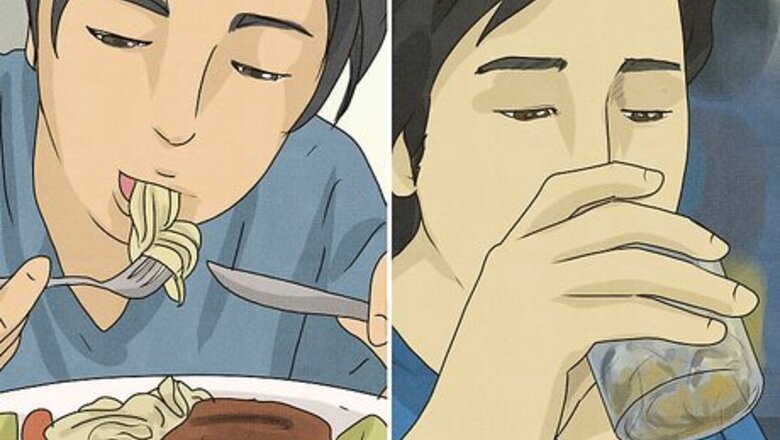
views
Eat before and during the party.
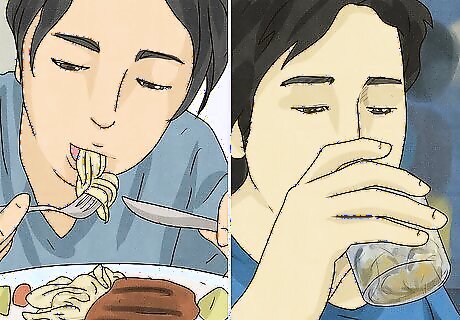
High-protein food is a great choice before a night of drinking. Alcohol can hit you much faster on an empty stomach. If you eat a full meal beforehand, you'll have a better time and be able to control how drunk you get. High-protein foods like meat, tofu, cheese, or nuts are best for this. Keep snacking while you're at the party too. If you're short on time, pack a couple of protein bars to eat on the way to the party. Salty snacks can make you thirsty. That's fine as long as you respond by drinking water, not booze.
Drink slowly, especially with cocktails and sweet drinks.
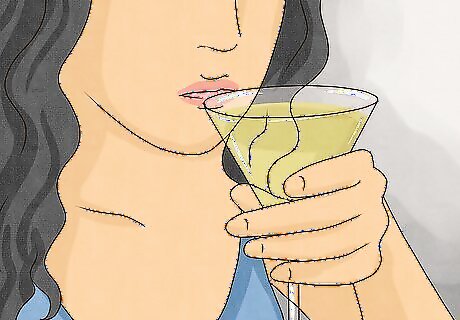
Sip your drink slowly even if you can't taste the alcohol. Beer or wine can taste kind of nasty your first time, so you'll probably enjoy a cocktail more. (That's juice or soda mixed with a hard liquor like rum.) But don't get carried away—even if it's delicious, it can still have a lot of alcohol in it. It's totally fine to take an hour to sip your way through a drink. That's about as fast as your body can process it. Don't feel pressured to keep up with other drinkers. One or two drinks is plenty to have fun. It's also good to think of "one drink" as roughly a can of beer—a cocktail or a large glass of beer can easily have as much booze as two or three drinks, so take those slow. Sweet bottled drinks like alcopops and wine coolers are usually weaker than cocktails (about 5% alcohol, like beer), but can also be easy to drink too quickly because of their flavor. For your first time drinking, you definitely want to avoid drinking hard liquor alone as "shots." These get you drunk very quickly, and can be strong and unpleasant if you're not used to them.
Track how you feel as you drink.
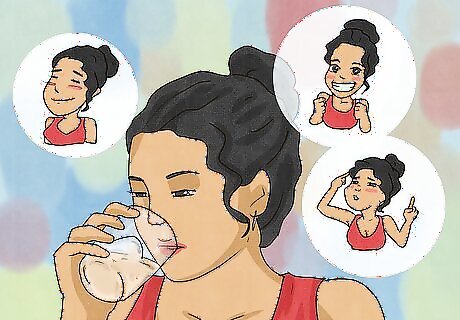
Alcohol makes you relaxed, excited, and confused. Even before you finish one drink, you can reach the "tipsy" stage, when most people feel a bit more relaxed, confident, and happy. If you keep drinking, this can turn into excitement, mood swings, and confusion. Once you're past the tipsy stage, you'll notice stronger physical effects as well—talking, hearing, seeing, and moving all get more difficult the drunker you are. Drinking slowly and waiting between drinks helps you stay in the earlier stages. Most people process about 1 drink per hour, so if you wait 1 hour after each drink, you're less likely to get too intoxicated. If your face and neck start to turn warm and red right after you drink, you might have alcohol intolerance. This is fairly common, especially among people with East Asian genes. It's best to stop drinking right away and see how you respond, as even a little alcohol can cause unpleasant side effects like nausea or a fast heart rate.
Switch between alcoholic and non-alcoholic drinks.
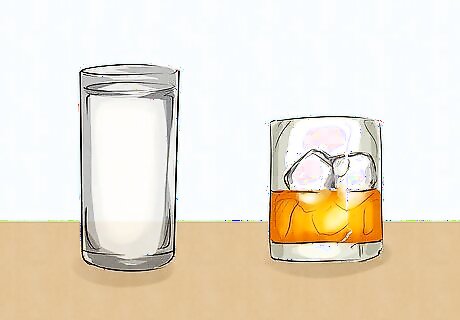
Drink a glass of water, juice, or soda after each glass of booze. Every time you finish a drink, pour yourself a tall glass of something non-alcoholic. This gives your body time to process the alcohol you just drank, so you can see how you feel before you decide to drink more. It also keeps you hydrated, so you don't end up reaching for another beer just because you're thirsty.
Avoid drinks if you didn't see what went into them.
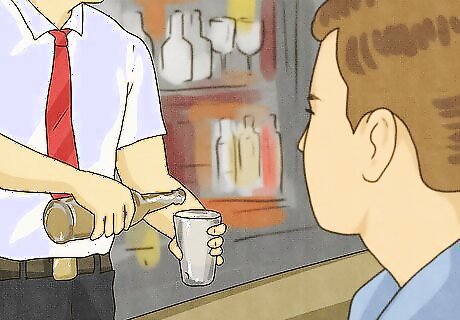
Punch bowls and mysterious drinks can have way too much alcohol or worse. That mixed drink that tastes like pineapple and energy drink? You have no idea what's in it, but at most parties you can bet it's strong. Your first time drinking should be a fun but careful experience, and that means knowing what you're drinking, not throwing up because you drank expired orange juice mixed with bathtub moonshine. Unfortunately, people also slip drugs into unattended drinks too often to not treat it as a real possibility. Only accept drinks that are mixed or opened right in front of you.
Teach yourself to mix a weak drink.
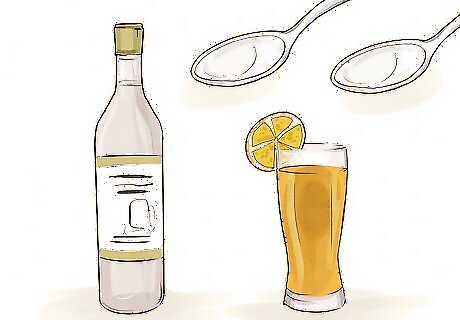
Use spoons or plastic cup lines to guide your cocktail making. Another partygoer might make you a drink much stronger than you'll enjoy. Instead, mix yourself a slightly weak drink that you'll enjoy more. This is easy if you're using an American plastic party cup—just pour the liquor (vodka, for instance) up to the lowest line on the cup, then add juice or soda to fill at least half the cup. If you don't have those cups around, see if you can find an ordinary kitchen spoon—one or two of those is enough for a weak mixed drink. If there are no spoons, you can eyeball it with the bottlecap instead. There's no standard size for bottlecaps, but 2 bottlecaps full (or a little less) is usually about right.
Learn how to say no to extra drinks.
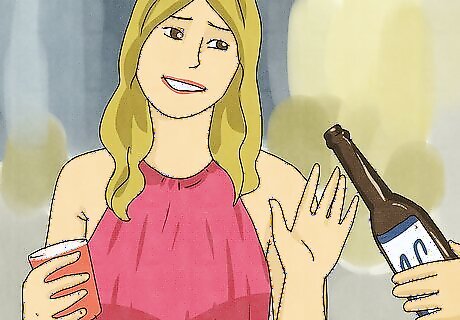
If politely refusing doesn't work, go get something non-alcoholic. Dealing with peer pressure is an important part of staying safe at parties. You always have the right to say "no thank you" to a drink offer, and should never accept just to be polite. If someone keeps pressuring you, make a vague excuse ("I have too much to do tomorrow"), or say "I'll go get myself something" and pour yourself a glass of juice or water. This also goes for offers to "top up" your drink before you've finished, which make it hard to keep track of your drinking. If someone is drinking a lot and trying to get everyone else to join them, they're probably just focused on getting drunk, not on you. Say something noncommittal like "sure, maybe a bit later" and they'll usually move on. If someone is focused on you directly and won't accept "no" as an answer, don't let them bully you. Ask a friend to stick with you and help change the topic, ignore the other person, or call the person out directly.
Stay away from caffeine, tobacco, and other drugs.
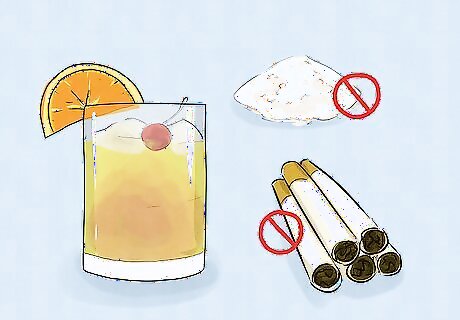
Mixing alcohol with other substances is too risky for your first time. Alcohol already makes it harder to make good decisions and keep track of how you're doing. Weed or other mind-affecting drugs make that problem even worse, and can add dangerous side effects. Even drinking caffeine and alcohol in the same night can be risky, since feeling energetic and excited can lead to over drinking. Nicotine can work a little like caffeine, canceling out the sleepiness alcohol causes. If you're a smoker, try to go easy on the tobacco, and don't drink more than you planned just because you don't feel too drunk. If you do decide to take other drugs anyway, make sure a friend (ideally a sober one) knows exactly what you took. That makes it easier to take care of you if an emergency happens.
Be careful with drinking games.
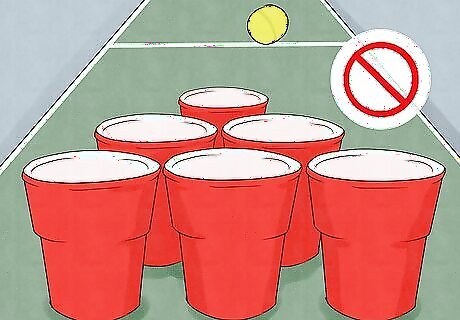
If you really want to play, use a non-alchoholic drink. Beer pong, king's cup, and all the other drinking games have one main goal: getting you drunk! When a table of friends are chanting at you to chug your drink, it's hard to say no—so it's no surprise that drinking games are linked to a lot of "accidental" binge drinking. If you really want to join that corner of the party, be smart about it: Play with soda or water, or at least with something weak like light beer. When the game rules tell you to take a drink, just take a small sip, not a big swallow. Ask a friend with more drinking experience to be on a team with you, so you can split the drinks between you. Keep track of how much you're drinking and how you're feeling. Leave the game if things are going overboard.
Arrange a safe trip home in advance.
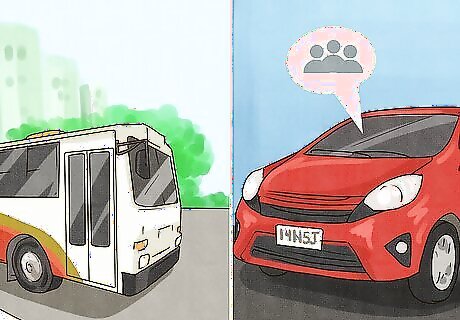
Don't start drinking until you know you can get home safely. Drinking and driving is incredibly dangerous. Before you even go to the party, make sure you can get home by walking, using public transportation, a rideshare, a taxi, or getting a ride with a sober friend. Whether or not you think you'll get drunk, it's safest to plan for the worst. Don't drive, and ask a friend for company even if you're walking home. Alcohol can be dangerous even for pedestrians. If you're at university, see if your school has a transport service for students.
Protect yourself from risky sex.
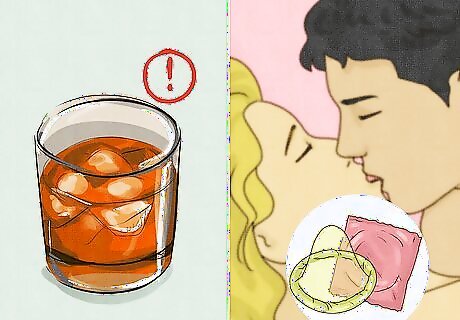
Sex can be a lot riskier with booze involved. Drunk people take bigger risks than sober ones, and that includes unsafe sex. Alcohol can make you (or your partner) too drunk to consent, with some pretty serious consequences the next morning. Your first time drinking is definitely not the time to get through this minefield. Rape can happen even within a long-time sexual relationship. Your partner shouldn't have sex with you if you are too drunk to make clear decisions.












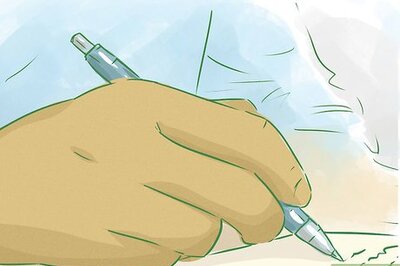


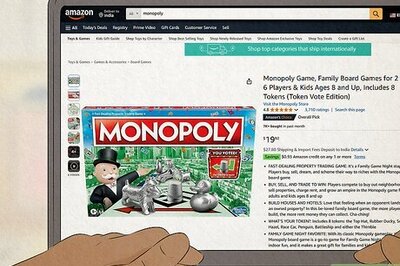
Comments
0 comment